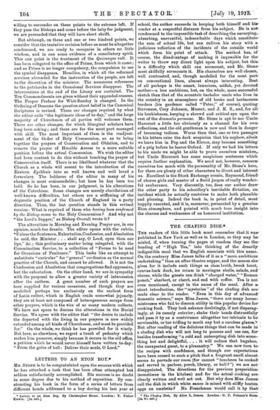LETTERS TO AN ETON BOY.*
Ma. STONE 18 to be congratulated upon the success with which he has attacked a task that has been often attempted but seldom satisfactorily accomplished. His success is no doubt in some degree due to his method of exposition. By con- structing his book in the form of a series of letters from different hands addressed to a boy during his last year at • Letters to an Mon Dog. By Christopher Stone. London: T. Fisher Unwin. [Cs. net.] school, the author succeeds in keeping both himself and his, reader at a respectful distance from his subject. He is noir. condemned to the impossible task of describing the unvarying,- absorbing, uneventful, indescribable days which constitute- the sum of school life, but can enliven his story with a• judicious reflection of the incidents of the outside world' which form his point of attack. The method has, of course, the disadvantage of making it impossible for the- writer to throw any direct light upon his subject, but this' is a difficulty which skill can surmount, and Mr. Stone most skilfully surmounts it. His characters are well chosen, well contrasted, and, though modelled for the most paxt- on conventional lines, almost always interesting. Best: of all perhaps is the smart, luxurious, selfish, yet devoted mother—a less ambitious, but, on the whole, more successful, sketch than that of the eccentric bachelor uncle who lives in the country in an atmosphere of old books and herbaceous- borders (his gardener called "Peter," of course), quoting- Stevenson, Cory Johnson, Mussel, and J. K. S., and, for all, his bookishness, keeping a shrewd and critical eye upon the- rest of the dramatis personae. Mr. Stone is apt to use .Uncle- Harcourt a little too obviously as a channel for his own? reflections, and the old gentleman is now and then in danger- of becoming tedious. Worse than that, one or two passagm in his letters raise the dark suspicion that his nephew, albeit we leave him in Pop and the Eleven, may become something- of a prig before he leaves Oxford. If only we bad his letters. to his uncle we might be able to prove ourselves mistaken, but Uncle Harcourt has some suspicious sentences which require further explanation. We need not, however, concern- ourselves too much with the personality of Mr. Stone's hero, for there are plenty of other characters to divert and interest7 us. Excellent is the Stock Exchange cousin, Raymond, friend' of chorus girls and master of a florid jargon of really wonder- ful exuberance. Very discreetly, too, does our author draw- the other party to his schoolboy's inevitable flirtation, an• incident which he actually contrives to make both plausible- and pleasing. Indeed the book is, in point of detail, most- happily executed, and it is, moreover, permeated by a genuine' Eton atmosphere, and pointed with much true insight into. the charms and weaknesies of an honoured institution.










































 Previous page
Previous page